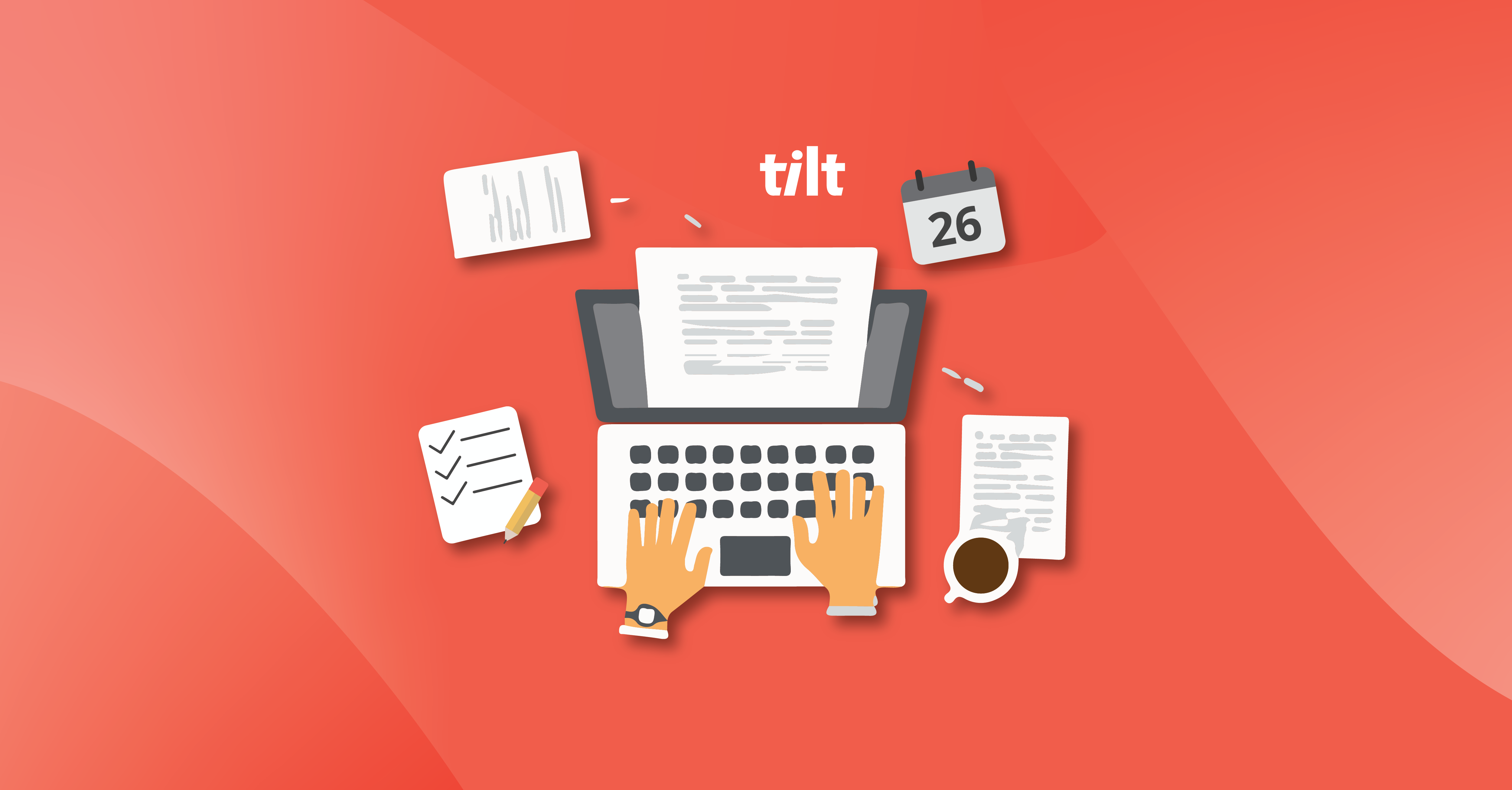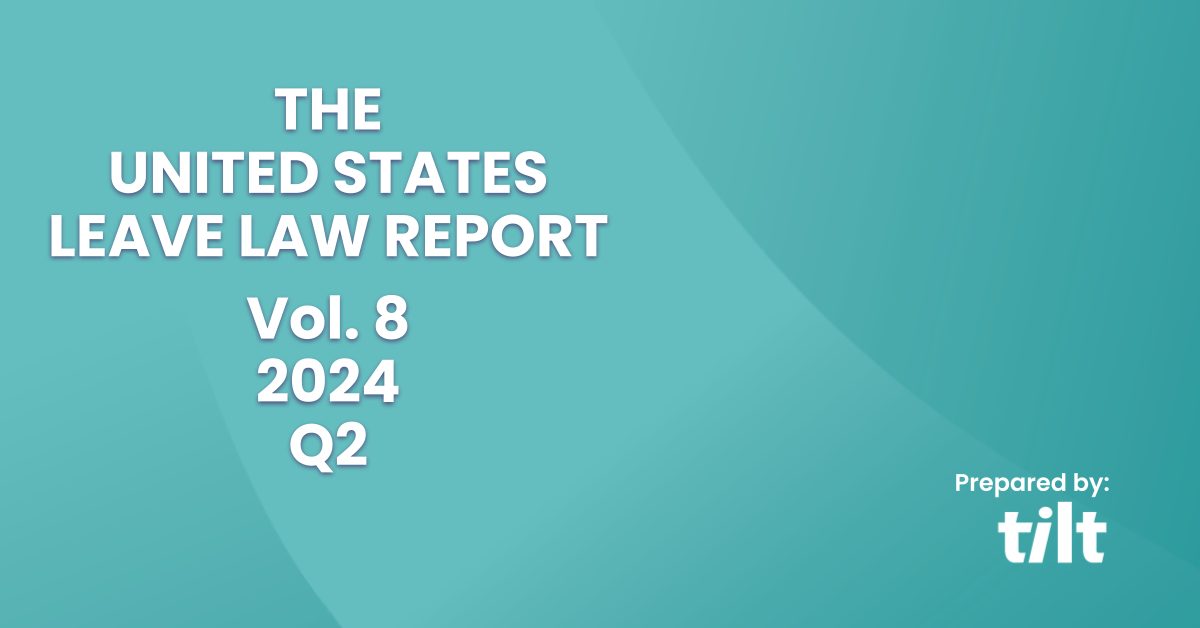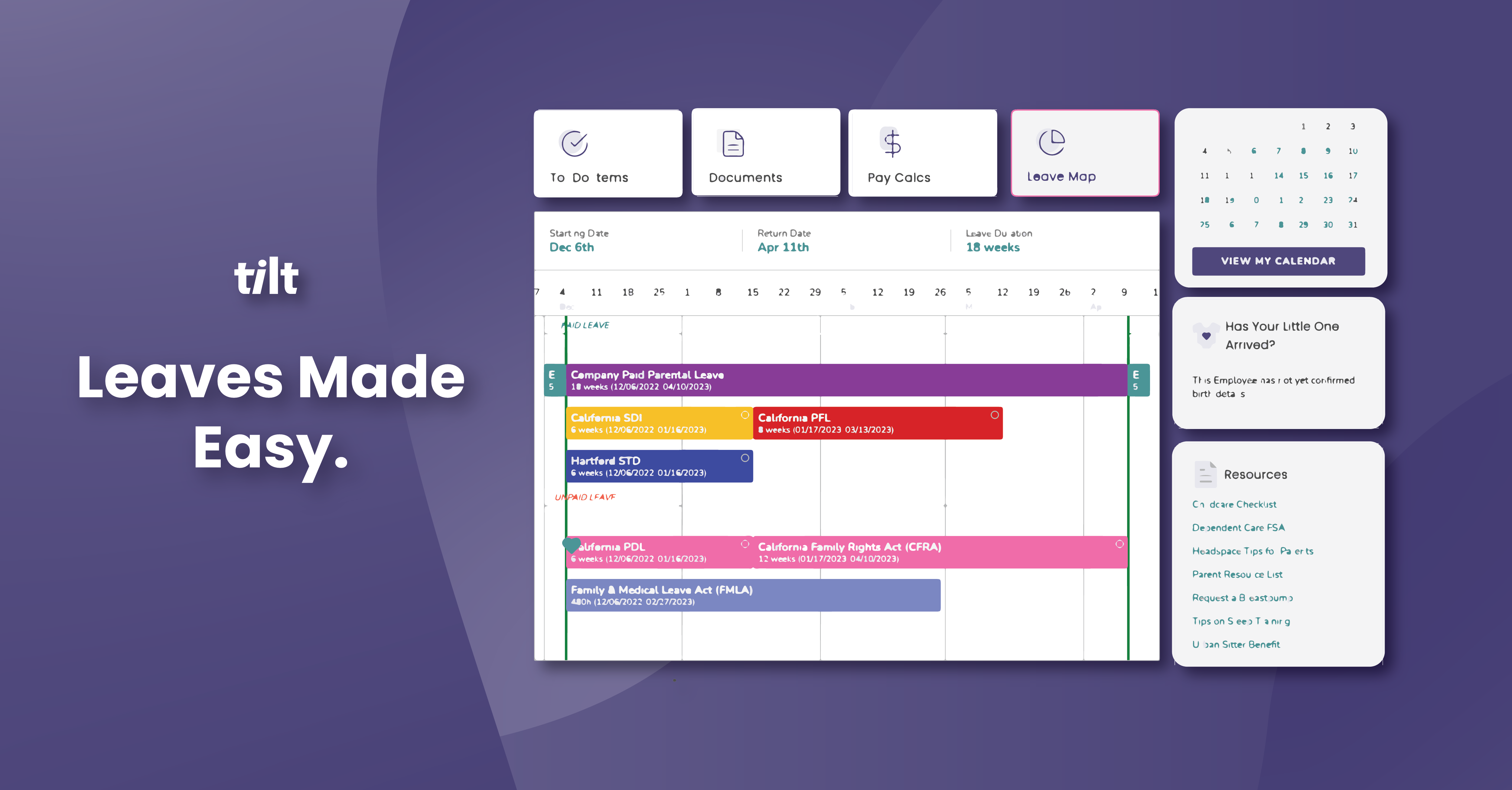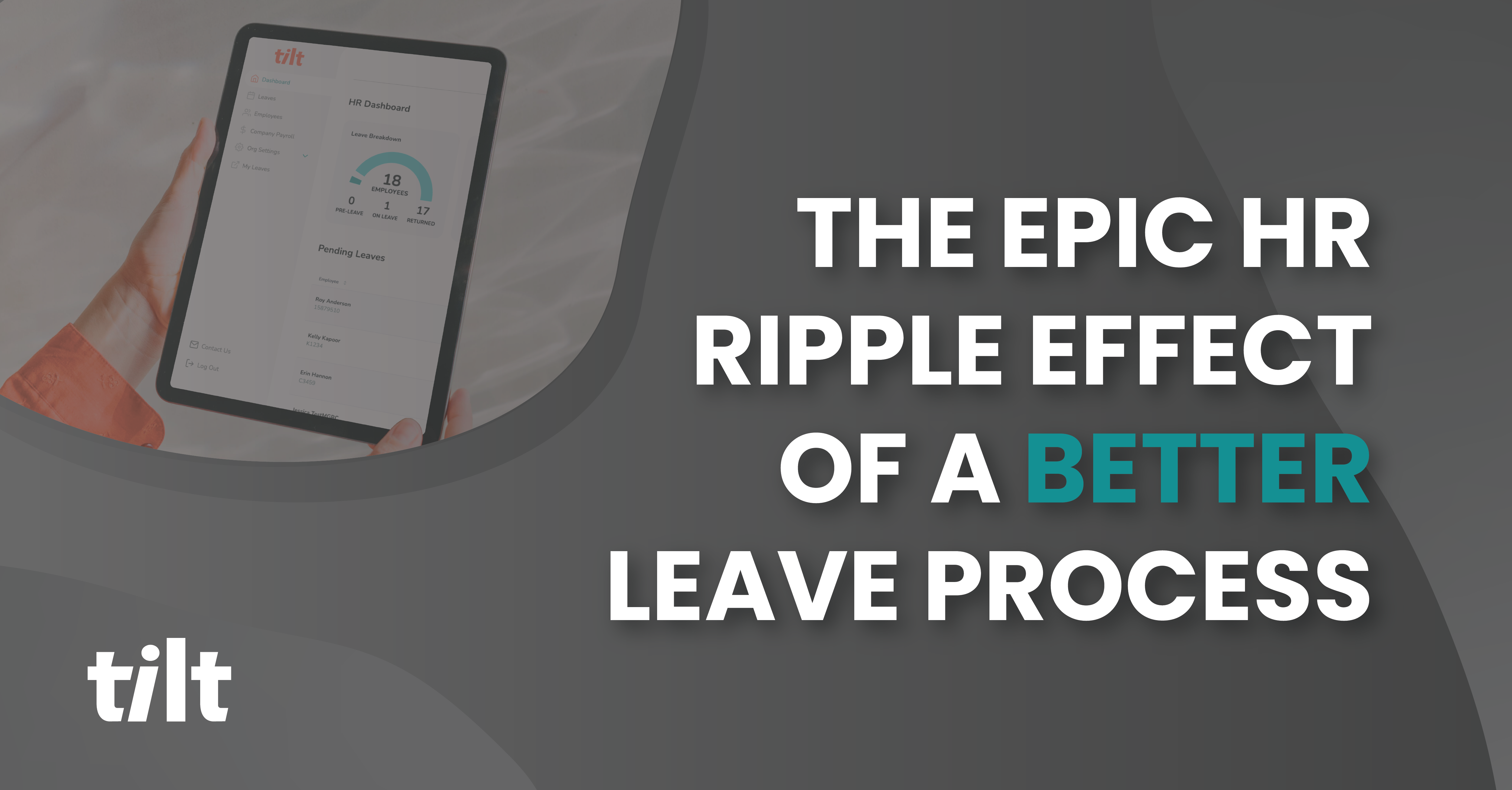411 (n): The mystical number people used to dial when Google was just a twinkle in the internet’s eye. Today, it’s a relic of a bygone era, a symbol of a simpler time when the information superhighway was more like a gravel road with vagrants and potholes (the vagrants apparently never left).
Another relic of a bygone era is the way in which HR pros used to manage their leaves of absence. We don’t need to tell you that HR leaders are now being asked by their organizations to do so much that it’s not uncommon for the finer details of a leave experience to get left in a ditch on the side of your mind.
When it comes to the Americans with Disabilities Act (ADA) accommodations, however, it’s imperative to know what’s required of your organization and to have a leave of absence management process in place that can set you and your employees up for success.
Below we’ll go over what’s required of you as an employer, and how a 3rd party leave of absence solution like Tilt might be the right option for you and make your life easier when it comes to ADA accommodations.
Understanding ADA Accommodation Requirements
We’ll get the obvious one out of the way, as in order to be successful in any pursuit it’s important to know the rules of the game and the ADA is no different. Familiarize yourself and your organization with the ADA and its requirements to provide reasonable accommodations to qualified individuals with disabilities, unless it would cause undue hardship.
When an employee requests ADA accommodations, it’s essential you follow a structured process to ensure compliance with the law and provide an inclusive work environment.
The Interactive Process of an ADA Accommodation Request
When an employee requests ADA accommodations, engaging in an interactive process is the cornerstone of ADA compliance and a vital element in accommodating employees with disabilities.
It involves open and productive communication between you as the employer and the employee to effectively address the accommodation request. During this process, you should actively listen to the employee’s needs and limitations, request necessary medical documentation when applicable, and explore various accommodation options that would enable the individual to perform essential job functions.
This collaborative approach helps ensure that both parties have a clear understanding of the accommodation request and its potential impact on the workplace.
How Tilt aids the interactive ADA accommodations process
Communication is a critical component of facilitating ADA accommodation requests. While the decision of what the accommodation will be and if the accommodation will be provided is a result of the interactive process between your organization and the employee, Tilt notifies HR and People Ops teams the moment it’s determined one of your employees is in need of submitting an ADA accommodation request. We even provide a help doc with checklists for your team to use internally that can assist in facilitating these conversations.
Requesting Medical Documentation for ADA Accommodations
Requesting medical documentation is a crucial step when an employee requests an accommodation under the ADA. Medical documentation provides you with a greater understanding of the nature and extent of your employee’s disability, and how it may impact their ability to perform essential job functions.
When requesting medical documentation, you should do so in a respectful and confidential manner, ensuring that only authorized individuals within the organization have access to the information.
It’s essential to provide clear guidance to your employee population on what specific medical information is needed to evaluate the accommodation request effectively. By collecting and handling this documentation with care and sensitivity, employers can make informed decisions regarding reasonable accommodations while upholding privacy and compliance with ADA regulations.
How Tilt aids in the medical documentation process for ADA Accommodations
The procuring and securing of medical documentation is often a nightmare scenario for HR and People Ops leaders due to how timely this process needs to be and how sensitive the information is that’s being collected and stored.
Tilt makes it easy for employees to upload important documents safely and securely right in the platform. Additionally, we remind (and re-remind, and re-re-remind if necessary) your employees of important dates so that deadlines are met and your organization stays ADA compliant.

Within the Tilt platform, you will have one central location to access all ADA-related paperwork. Tilt can receive ADA documents the same way we receive any other documents for any other leave so your employees have a smooth, consistent and secure file-sharing experience.
How to Evaluate a Reasonable ADA Accommodation
Once the medical documentation is received, you should work with the employee to identify reasonable accommodations that will enable them to perform their essential job functions effectively. The evaluation should be a thorough assessment of potential solutions that consider the individual’s specific needs, the nature of their job, and your organization’s resources to determine the most suitable and practical accommodation. These accommodations can vary widely, and should not cause undue hardship on your organization.
When you have an accommodation plan in place, it’s important that all interactions related to the accommodation request should be documented. This includes the initial request, medical documentation, accommodation options considered, and the final accommodation plan.
Once the accommodation has been agreed upon by both parties it should be promptly implemented. This may involve adjusting workspaces, providing specialized equipment, or altering job duties as needed.
After implementing the accommodation plan, it’s a best practice to periodically check in with the employee to ensure that the plan is fulfilling its intended purpose. If necessary, adjustments can be made to the accommodation plan.
Note: Tilt helps facilitate the need for dialogue between you and the employee while empowering your organization to make the ADA accommodation decisions and plans that are best for your organization. We are leave law experts, but we legally can’t make these decisions for you and you wouldn’t want us to. It should be noted that as an employer, if a complaint is filed for failure to accommodate your organization is still on the hook, which is all the more reason you want to be the ones making the decisions on this.
How Tilt Helps with the ADA Accommodations Process
Tilt understands that navigating ADA accommodation requests can be intricate, especially for employers with limited resources or expertise in disability compliance. Tilt is an invaluable partner for your ADA processes by identifying, communicating, and tracking ADA leaves and securely storing all important documents.
As mentioned above, Tilt helps facilitate the ADA accommodations conversation whenever an employee requests an ADA leave, or, in the event a leave transitions from one type of leave to an ADA leave. With Tilt, you eliminate the risk of leaving your employees in the ADA lurch while supporting them efficiently and with empathy.
Tilt also takes confidentiality security extremely seriously. Our platform ensures the safe storage of sensitive employee information and documents, as well as only providing access to said information to the people who need it. We encrypt all information on our platform and we are SOC II compliant.
Rest assured that our in-house team of leave law experts knows everything there is to know about ADA. Not only does their immense expertise back all of the information on our platform, they also support our support team. Meaning if you have questions about what you’re required to do for ADA, we’ve got your back there too.
While we are ADA experts, Tilt doesn’t get involved in the accommodation decision-making process, therefore we recommend seeking legal counsel if there are complex or disputed accommodation requests to ensure that your organization is meeting its legal obligations.
Tilt does, however, support leave-related ADA accommodations, and if you’re interested in having Tilt manage non-leave accommodations let us know! It’s something we hope to offer in the future.
Approaching ADA accommodation requests with sensitivity, empathy, and a commitment to fostering an inclusive work environment is paramount. Doing so will require maintaining clear communication throughout the process and can help create a successful outcome for both the employee and your organization.
About Tilt
Tilt is leading the charge in all things leave of absence management through easy-to-use tech and human touch. Since 2017, our proprietary platform and Empathy Warriors have been helping customers make leave not suck by eliminating administrative burdens, keeping companies compliant, and providing a truly positive and supportive leave of absence experience for their people.

